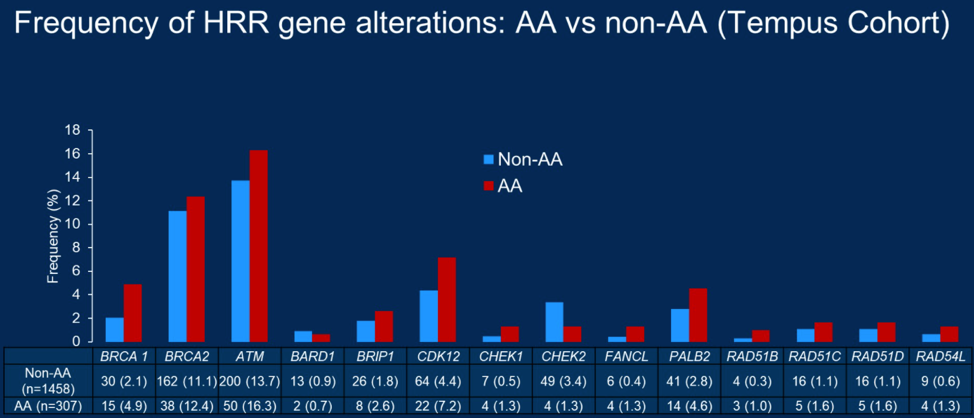(UroToday.com) African American men have a 1.6-1.8-fold higher risk of developing prostate cancer, develop prostate cancer at a younger age, and tend to have more aggressive disease at diagnosis. Disparities in prostate cancer outcomes for these men are likely influenced by both socioeconomic and healthcare access issues, as well as genetic factors. In this study, Dr. Khashab presented genomic data derived from a retrospective analysis of patients treated at a community-focused academic healthcare system in Texas that serves a higher percentage of Hispanic and African American patients with prostate cancer.
Overall, 100 patients with prostate cancer, including 53 African American patients, who received androgen deprivation therapy for locally advanced, biochemically recurrent or metastatic prostate cancer were analyzed using (1) a 648 gene tissue-based tumor DNA sequencing panel to an average depth of 500x, often with paired normal blood specimens and matched whole-transcriptome sequencing and (2) a 105 gene liquid circulating tumor DNA sequencing panel with average sequencing depth of 5000x. This cohort was examined relative to other next generation sequencing data from a nationwide cohort of 1765 metastatic prostate cancer patients including 307 African American patients.
Of the 100 patient in this cohort, the African American patient tumors tended to have more alterations in TP53, SPOP, the AR, and homologous recombination genes as well as a lower incidence of TMPRSS2 gene fusions.

Amongst selected homologous recombination genes, the frequency of alterations in each gene are shown in the figure below.

The higher proportion of TP53, SPOP, AR and HR gene mutations were confirmed in the nationwide larger cohort, as shown below.

And the overall numbers of specific HR gene mutations are shown in the following figure.

Dr. Khashab concluded that this data provide a snapshot of genomic alterations in patients with advanced prostate cancer from both a hospital serving a large population of racial and ethnic minorities and a nationwide cohort (Tempus cohort). He speculated that the increased frequency of HR gene alterations may influence the ongoing discrepancy in clinical outcomes amongst African American patients with prostate cancer.
Presented by: Tamer Khashab, MD, Harris Health/Ben Taub Hospital, Houston, TX
Written by: Alok Tewari, MD, PhD, Medical Oncologist at the Dana-Farber Cancer Institute, during the 2021 American Society of Clinical Oncology Genitourinary Cancers Symposium (#GU21), February 11th-February 13th, 2021


